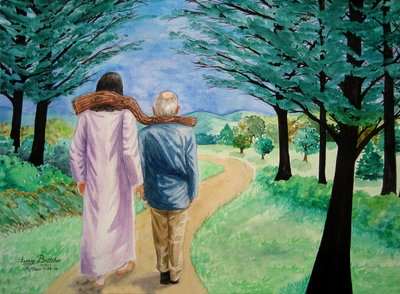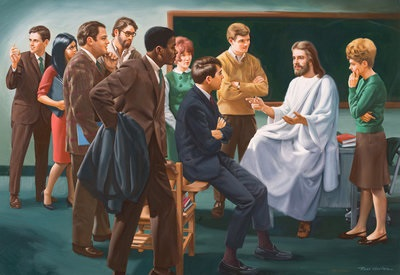Tuesday, July 20
After David has unwittingly pronounced judgment on himself (
2 Samuel 12:5,
6), Nathan confronts him with the enormity of his sin. David’s heart is broken, and he confesses his sin. Immediately Nathan assures him that “The Lord also hath put away thy sin” (
2 Samuel 12:13) and that he is forgiven. There is no waiting period on God’s forgiveness. David doesn’t have to prove that he is really sincere before forgiveness is extended.
However, Nathan, who has already predicted the consequences of David’s sin in
2 Samuel 12:10-12, goes on to state that the child to be born will die.
What does it mean that God had taken away David’s sin? Did He just wipe the slate clean? Does everyone just simply forget about it? Read
2 Samuel 12:10-23 as you contemplate these questions.
David must also have wondered about these questions as he saw his world crumbling — the baby dead, his family in disarray (the stories of Amnon and Absalom are two good examples of real-life family troubles), his future uncertain. And yet, despite the consequences of his sin, which has affected innocent people such as Uriah and the new-born baby, David also begins to understand that God’s grace will cover this and that someday all the consequences of sin will be done away with. In the meantime, he can find rest for his troubled conscience in God’s grace.
What does David feel he really needs? What does he yearn for? Read
Psalm 51:1-6.
With Psalm 51, David goes public as he opens his heart and confesses his sins. David’s cry for mercy appeals to God’s unfailing love and His great compassion. He yearns for renewal.
When we consider the cost of rest in Jesus, we need first to recognize that we need outside help; we are sinners and need a Savior; we recognize our sins and cry out to the only One who can wash us, cleanse us, and renew us. When we do this, we can take courage: here is an adulterer, a manipulator, a murderer, and someone who violated at least five of the Ten Commandments who calls for help — and claims the promise of God’s forgiveness.
If God forgave David for what he did, what hope is there, then, for you?
Wednesday, July 21
After David has confessed his sin without trying to excuse it or gloss over it, he goes on to petition God. What does he ask God for? Read
Psalm 51:7-12.
David’s reference to cleansing with hyssop utilizes terminology known to every Israelite who had ever visited the sanctuary. As he refers to the ritual acts of cleansing described in the Law of Moses (
Leviticus 14:4), he recognized the power of a sacrifice — the Sacrifice — who would come in the future to take away the sins of the world.
David also goes on to ask for “joy” and “gladness.” In the face of the enormity of his sin, isn’t this a little audacious?
Perhaps it may be helpful to listen to this paraphrase: “Tell me I am forgiven so that I may enter the sanctuary again where I can hear the joy and gladness of those worshiping you.”
When Adam and Eve sinned, they hid from God’s presence (
Genesis 3:8). Why do you think David’s request, even after his sin, is so different? Read
Psalm 51:11,
12.
David does not want to lose the consciousness of living in God’s presence. He realizes that without the Holy Spirit, he is powerless. He knows that, as easily as he slipped into sin with Bathsheba, he could slip into sin again. His self-confidence is shattered.
David understands that future victories will not come from him; they will come only from God as he depends totally on God.
The victorious Christian life is not all about us. It is all about Jesus. We yearn for His presence; we crave His Spirit; we want His joy of salvation. We recognize our need for renewal and restoration. We need His rest — a divine act of re-creation. Creation rest is not far from forgiveness. “Create in me a clean heart, O God; And renew a right spirit within me” (
Psalm 51:10) uses creation terminology. In the Old Testament only God can “create” (bara’) — and once we have been re-created, we can rest.
If you haven’t experienced the joy and gladness of liberation from a guilty conscience, what is holding you back? If it is guilt, what could you learn from this story that should help you?
Thursday, July 22
Probably the most natural thing for us to do after working through an embarrassing failure and experiencing forgiveness is to try to forget that the event ever happened. Memories of failure can be painful.
What does David want to do with his painful experience? Read
Psalm 51:13-19.
When a bowl or a precious vase falls and breaks into pieces, we normally sigh and throw the useless broken pieces away. In Japan there is a traditional art called kintsugi, which specializes in recreating broken pottery. A precious metal, such as liquid gold or silver, is used to glue the broken pieces together and to turn the broken item into something of beauty and value.
Every time God forgives our transgressions and re-creates us again, something changes. God’s precious forgiveness glues our brokenness together, and the visible breaks can draw attention to His grace. We can become God’s loudspeakers. “And my tongue shall sing aloud of thy righteousness” (
Psalm 51:14). We don’t attempt to self-repair or auto-improve (even incrementally). Our broken spirits, our contrite hearts, are enough praise for God — and they are beams of light that the world can see surrounding us. Our experience of being forgiven attracts others who are searching for forgiveness.
What relationship is there between Psalm 51 and
1 John 1:9?
First John 1:9 is a short summary of Psalm 51. As David knows that “A broken and a contrite heart, O God, thou wilt not despise.” (
Psalm 51:17), John assures us that “If we confess our sins, he is faithful and just to forgive us our sins, and to cleanse us from all unrighteousness.” (
1 John 1:9). We can take God at His word.
Again, David could not repair the tremendous damage that he had done through his acts and example to his family. He suffered the consequences of his decisions and actions. And yet, David knew that he had been forgiven. He knew that he needed to trust by faith that one day the true Lamb of God would come and stand in his place.
How can you learn right now to apply the promises of
1 John 1:9 to your own life? How should you feel after you do so and know that the promise is for you, too?
Friday, July 23
Further Thought: “David’s repentance was sincere and deep. There was no effort to palliate his crime. No desire to escape the judgments threatened, inspired his prayer. … He saw the defilement of his soul; he loathed his sin. It was not for pardon only that he prayed, but for purity of heart. … In the promises of God to repentant sinners he saw the evidence of his pardon and acceptance. … ‘The sacrifices of God are a broken spirit: a broken and a contrite heart, O God, Thou wilt not despise.’
Psalm 51:16,
17.
Though David had fallen, the Lord lifted him up …
David humbled himself and confessed his sin, while Saul despised reproof and hardened his heart in impenitence.
This passage in David’s history is … one of the most forcible illustrations given us of the struggles and temptations of humanity, and of genuine repentance. … Through all the ages … thousands of the children of God, who have been betrayed into sin, … have remembered … David’s sincere repentance and confession … and they also have taken courage to repent and try again to walk in the way of God’s commandments.
Whoever … will humble the soul with confession and repentance, as did David, may be sure that there is hope for him. … The Lord will never cast away one truly repentant soul.” Ellen G. White,
Patriarchs and Prophets, pp. 725, 726
Discussion Questions:
1. How can we find the balance between recognizing our inherent sinfulness and need for forgiveness, and at the same time, living like the forgiven sons and daughters of the King of the Universe that we are?
2. Why is all sin, ultimately, sin against God? What does it mean to sin against God?
3. What can we say to someone, not a believer, who struggles with the suffering of innocent people, such as Uriah or the newborn son of David and Bathsheba? How do we explain the love and justice of God in such a situation? How does the perspective of the great controversy offer a helpful outlook?
4. Why would the Bible devote two full chapters to the sordid story of David and Bathsheba? What purpose does the recounting of this story serve?
5. Dwell on the idea that sin separates us from God as expressed in
Psalm 51:11,
12. What has been your own experience with how this happens? How do you feel? How would you explain to someone what this separation feels like and why it’s so uncomfortable? Why is the promise of grace the only remedy?



























